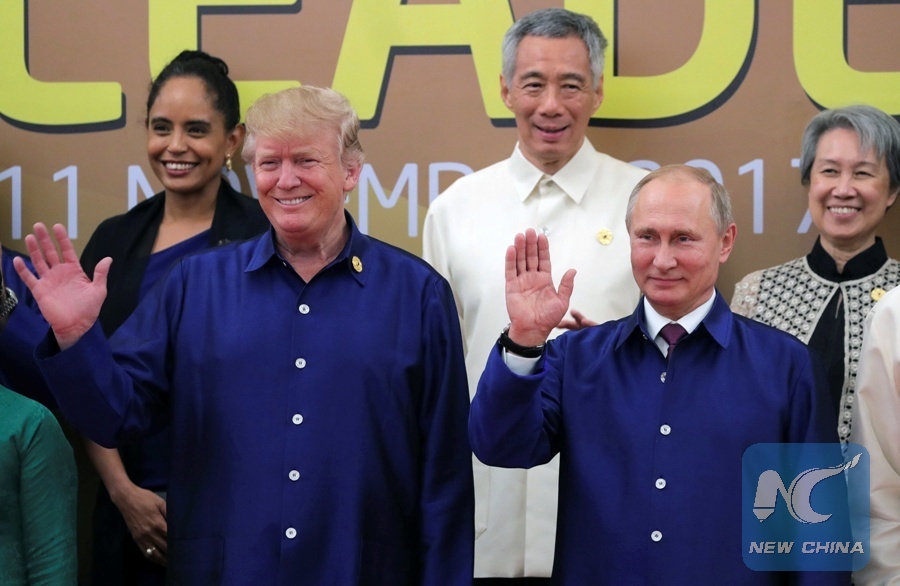Trump's planned summit with Putin fraught with challenges
- By Haifa Said
 0 Comment(s)
0 Comment(s) Print
Print E-mail China.org.cn, July 2, 2018
E-mail China.org.cn, July 2, 2018

Unavoidable controversy looms over the first full-fledged one-on-one meeting between Donald Trump of the United States, the world's most powerful country, and the recently re-elected Vladimir Putin of Russia, which is labeled by the former as a major competitor and threat.
The much-anticipated summit, slated for July 16, was agreed to be held on neutral ground in Finland, during a meeting between Trump's National Security Adviser John Bolton and Putin in Moscow on June 27.
Ukraine and Syrian have been reported to be high on the agenda of the talks, which are being held upon Trump's initiative, among other issues related to the overall international situation, that might include North Korea as well as the control and reduction of nuclear weapons.
Trump has been seeking to put the strained U.S.-Russian relations back on an positive track, hoping that breaking the ice with Russia might be in the interest of national security and world peace.
However, this might prove to be no easy task, given the heavy weight of the unresolved concerns raised by his longtime Western partners, compounded with the domestic skepticism and rebuking for attempting to warm ties with Russia. Divisions still exist on whether to be tougher or easier on Russia, amid lack of a broader U.S. strategy for how to deal with Moscow.
An acute rift has developed recently between Washington and its Western and NATO allies surrounding heated trade disputes and Trump's scrapping of longstanding partnership and international agreements, the latest of which was the Iran nuclear deal, which has left European leaders unable to mop up the mess in its aftermath and save their heavily damaged interests.
There is risk that the summit with Putin might add to a widening of the rift, given Trump's unpredictability and complete ignoring of his partners' concerns. This is particularly a concern as the meeting is set to follow a NATO summit in Brussels, which Washington might also use as a platform to scold the Western alliance.
While Trump has been trying to soften his tone on Russia, hinting at the legitimacy of Russia's annexation of Crimea from Ukraine in 2014, on the ground that Crimea's residents speak the Russian language, European leaders agreed on June 29 to extend economic sanctions against Moscow over its "interference" in the internal Ukrainian conflict in 2013.
Trump also challenged his G7 allies at a recent summit in Canada by calling for readmitting Russia into the Group, whose membership was suspended after the outbreak of the crisis in Ukraine.
Relations with Russia have especially deteriorated with the mass expulsion of over 100 Russian diplomats from more than 20 countries - including 60 from the U.S. - that aligned with Britain and supported its accusations against Moscow of a nerve agent attack on former Russian double agent Sergei Skripal in the U.K.'s Salisbury in March.
Western countries have also lashed out at Russia over its "destabilizing" activities in the Middle East, mainly over its military involvement in the Syrian crisis in support of President Bashar al-Assad, who is accused by the West of killing his people and allegedly poisoning them to death using internationally banned chemical weapons.
These allegations almost brought Russia and Western countries into a direct military clash with the tripartite U.S.-French-British missile attack on Syrian sites last April, that took place against the backdrop of exchanged projections of nuclear power by Washington and Moscow amid fear of a new world arms race.
Russian individuals and entities have also been slapped with U.S. sanctions over Moscow's "malicious" cyber activities that are considered a "threat" to the safety and security of the U.S. and its allies.
A particular thorny domestic issue that poses a challenge to Trump's attempt to thaw ties with Putin is the accusations of collusion between Trump's 2016 electoral campaign officials and Russian agents to influence the election results.
Trump is being sharply rebuked by Democrats for his repeated tweets of skepticism against the conclusions of the U.S. intelligence community's investigation purportedly confirming Russian meddling in the elections.
They dismiss his denials as giving the green light for future meddling by Moscow. Trump is therefore under pressure to confront Putin with this issue at the forthcoming summit.
Amid these prevailing tensions, expectations of what the planned talks could bring about have been downplayed, with the U.S.'s Western partners and Trump's domestic allies as well as rivals fearing his personal flattery-based diplomacy might fail him, and he may make concessions that would tilt the balance in favor of Russia, similar to those they believe he made at his recent historic meeting with North Korea's leader Kim Jong-un.
However, Trump still hopes to come up with results from his meeting with Putin, including striking a deal with Russia on an "exclusion zone" to stop the Syrian army's advance in southwest Syria and block the Iranian presence there to pave the way for a U.S. withdrawal from the country, according to reports.
Haifa Said is chief editor of the English Department at the Syrian Arab News Agency.
Opinion articles reflect the views of their authors, not necessarily those of China.org.cn.






Go to Forum >>0 Comment(s)